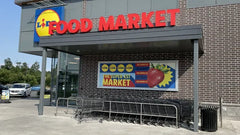
The Rise and Fall of Ami Colé: A Cautionary Tale for Black-Owned Beauty Brands
Table of Contents
- Key Highlights:
- Introduction
- The Birth of Ami Colé: A Vision for Inclusivity
- The Impact of Market Dynamics on Black-Owned Brands
- Navigating the Challenges: The Role of Social Media and Influencers
- The Decline of Interest in Diverse Brands
- The Consumer Perspective: A Call for Sustainable Support
- Conclusion: Lessons for the Future of Black Entrepreneurship
Key Highlights:
- Ami Colé, a beauty brand founded by Diarrha N’Diaye-Mbaye, will cease operations next month, underscoring challenges faced by Black-owned businesses in securing sustainable funding.
- Despite initial investor enthusiasm post-George Floyd's murder, the financial support for Black-founded brands has significantly declined, with funding dropping to 0.4% of all startup investment in 2022.
- The beauty industry continues to present barriers for Black entrepreneurs, who struggle to compete with larger, well-funded brands and navigate the evolving consumer landscape.
Introduction
The beauty industry has long been a space where innovation meets cultural expression, yet it remains fraught with challenges, particularly for Black-owned brands. The recent announcement that Ami Colé, a beauty brand acclaimed for its inclusive products, will close its doors next month highlights a troubling trend: the fragility of Black entrepreneurship in a landscape once buoyed by a wave of support. Founded by Diarrha N’Diaye-Mbaye, Ami Colé captured the hearts of many with its shade-inclusive makeup and innovative lip oils. However, the brand's journey from inception to closure illustrates the complex dynamics of funding, consumer interest, and the harsh reality of competing against corporate giants.
N’Diaye-Mbaye’s experiences shed light on a broader narrative that encompasses the rise and fall of many Black-owned businesses. It raises critical questions about the sustainability of Black entrepreneurship in a climate where financial backing often falters, and consumer interest wanes. This article explores the circumstances surrounding Ami Colé’s closure, the implications for Black-owned businesses, and the systemic issues that hinder long-term success in an industry increasingly dominated by larger players.
The Birth of Ami Colé: A Vision for Inclusivity
Ami Colé was born out of N’Diaye-Mbaye’s lifelong experiences in the beauty world, particularly her upbringing in her mother’s Harlem braiding salon. Her journey began with a vision to create a beauty brand that resonated with and represented Black consumers. In 2019, N’Diaye-Mbaye pitched her brand to over 150 investors, successfully raising $1 million in a landscape that was becoming increasingly receptive to Black entrepreneurship following the social justice movements of 2020.
The brand’s initial success was bolstered by a national trend that saw consumers rallying around Black-owned businesses. The murder of George Floyd spurred a significant increase in awareness and investment in brands led by people of color, marking a period of optimism and growth for many entrepreneurs. Ami Colé capitalized on this moment, garnering attention for its dedication to shade inclusivity and innovative product offerings. However, this wave of support was not destined to last.
The Impact of Market Dynamics on Black-Owned Brands
Despite the promising start, N’Diaye-Mbaye faced significant hurdles as she sought to scale her brand. The beauty industry, characterized by rapid innovation and intense competition, proved to be a challenging environment. While the brand enjoyed initial support, the growth trajectory at Sephora, a key retail partner, did not match the expectations set by larger corporate brands. As demand surged, the cost of scaling production became increasingly prohibitive.
In her reflection on the brand’s journey, N’Diaye-Mbaye expressed frustration with the shifting attitudes of investors who had once championed inclusivity. "Instead of focusing on the healthy, sustainable future of the company," she remarked, "I rode a temperamental wave of appraising investors." This sentiment resonates deeply with other Black entrepreneurs who have experienced similar fluctuations in support and funding.
The decline in funding for Black-owned businesses cannot be overlooked. According to Crunchbase News, only $730 million was allocated to startups with Black founders in the previous year, a staggering drop of over two-thirds from 2021. This significant reduction highlights the precarious nature of financial backing for Black entrepreneurs, who often lack the same access to capital as their white counterparts.
Navigating the Challenges: The Role of Social Media and Influencers
The rise of platforms like TikTok and Instagram has transformed how beauty brands connect with consumers. However, while visibility has increased, the underlying financial support necessary for sustained growth has diminished. Influencers and creators have gravitated toward brands that resonate with their audiences, yet the pressure to continuously innovate and compete with larger brands persists.
Tiara Willis, an esthetician and beauty influencer, noted the cultural shift in support for Black-owned brands since 2020. Initially, brands rushed to partner with diverse creators, but long-term commitments and substantial product offerings have since waned. The challenges faced by Ami Colé in meeting consumer demand were exacerbated by the competitive landscape, where larger brands can launch new products with greater frequency and leverage established retail relationships.
Celebrity-backed brands, such as Hailey Bieber's Rhode, further complicate the playing field for Black-owned businesses. With substantial financial resources at their disposal, these brands can dominate the market, leaving smaller, independent entities struggling to maintain visibility and relevance. Willis pointed out the disparity in resources: "They rarely ever start by themselves, like the rest of us do — they already have someone on their team."
The Decline of Interest in Diverse Brands
The societal shifts surrounding diversity and inclusion have led to a chilling effect on the support of Black-owned businesses. As the urgency to uplift these brands diminished, so did the financial backing from investors and consumers. The challenges of operating in a retail environment, especially one as competitive as Sephora, have become more pronounced. Javon Ford, a cosmetic chemist and entrepreneur, emphasized the need for capital in supporting sustainable business models. "The issue is money. It’s capital," he stated, highlighting the reality that operating at a high level in retail requires significant financial investment.
The interplay of social dynamics, investor sentiment, and market competition has left many Black entrepreneurs in a precarious position. While the initial enthusiasm for Black-owned brands was palpable, the subsequent decline raises questions about the long-term commitment of both investors and consumers to support diversity in the beauty industry.
The Consumer Perspective: A Call for Sustainable Support
As Ami Colé prepares to close its doors, consumers have rallied to support the brand in its final days. Reports indicate a surge in sales, particularly for popular products like lip oils, as customers rush to stock up before the brand's closure. Yet, this consumer interest raises important questions about the motivations behind supporting Black-owned businesses.
While many consumers feel a sense of responsibility to uplift Black entrepreneurship, it is critical to recognize that the issue extends beyond consumer choice. The sustainability of Black-owned brands is intricately linked to access to capital and long-term investment. Ford articulated this sentiment, emphasizing that financial backing is essential for brands to thrive, especially in large retail environments where operational costs can be overwhelming.
Furthermore, Willis pointed out the inconsistency in support for Black creators, illustrating how external events often dictate the level of attention and investment they receive. "It creates financial insecurity, where I get the most support of brands based on what’s going on in the news," she explained, reflecting a broader concern about the sustainability of interest in Black-owned brands.
Conclusion: Lessons for the Future of Black Entrepreneurship
The closure of Ami Colé serves as a poignant reminder of the challenges faced by Black-owned businesses in an industry that often prioritizes scale and corporate backing over innovation and inclusivity. N’Diaye-Mbaye’s journey from a hopeful entrepreneur to a founder faced with insurmountable obstacles encapsulates the struggles and triumphs of many in the Black beauty space.
As the beauty industry continues to evolve, it is imperative for consumers, investors, and industry leaders to reflect on the systemic issues that hinder the success of Black-owned brands. Sustainable support requires a commitment to long-term investment and a recognition of the unique challenges faced by these businesses.
The lessons learned from Ami Colé’s journey should inform future efforts to uplift Black entrepreneurship. By fostering an environment that prioritizes equitable access to resources and support, the beauty industry can create a more inclusive and diverse marketplace that celebrates the contributions of Black entrepreneurs.
FAQ
What led to the closure of Ami Colé? The closure of Ami Colé can be attributed to a decline in financial support and challenges in scaling production amid increasing competition from larger brands. Founder Diarrha N’Diaye-Mbaye expressed frustration with fluctuating investor interest and the pressures of operating in a cutthroat retail environment.
How has the funding landscape changed for Black-owned businesses? Funding for Black-owned businesses has significantly decreased in recent years, dropping to just 0.4% of total startup investment in 2022. This decline poses significant challenges for Black entrepreneurs seeking to grow their brands in a competitive market.
What role do social media and influencers play in the success of beauty brands? Social media platforms have increased visibility for beauty brands, but the financial support necessary for sustained growth has diminished. Influencers often face pressures to continuously innovate, competing against larger brands with substantial resources.
What can consumers do to support Black-owned businesses sustainably? Consumers can contribute to the sustainability of Black-owned businesses by advocating for equitable access to funding and long-term partnerships. Supporting brands consistently, rather than only during moments of heightened awareness, can foster a more sustainable growth environment.
What are the broader implications of Ami Colé’s closure for the beauty industry? Ami Colé’s closure highlights the systemic barriers faced by Black-owned businesses and raises questions about the commitment of the beauty industry to inclusivity and diversity. It underscores the need for sustained investment and support for Black entrepreneurs to thrive in an increasingly competitive landscape.
당신의 전자상거래를 우리의 주간 통찰력과 업데이트로 강화하세요!
상거래 세계에서 일어나는 일에 대한 정보를 계속 업데이트하세요
이메일 주소
당신을 위해 엄선했습니다

04 August 2025 / Blog
Maeve Emerges as a Standalone Brand: Anthropologie's New Strategy for Growth
더 읽기
04 August 2025 / Blog
The Evolution of In-Store Retail Media: Strategies for Enhanced Customer Engagement
더 읽기
04 August 2025 / Blog


